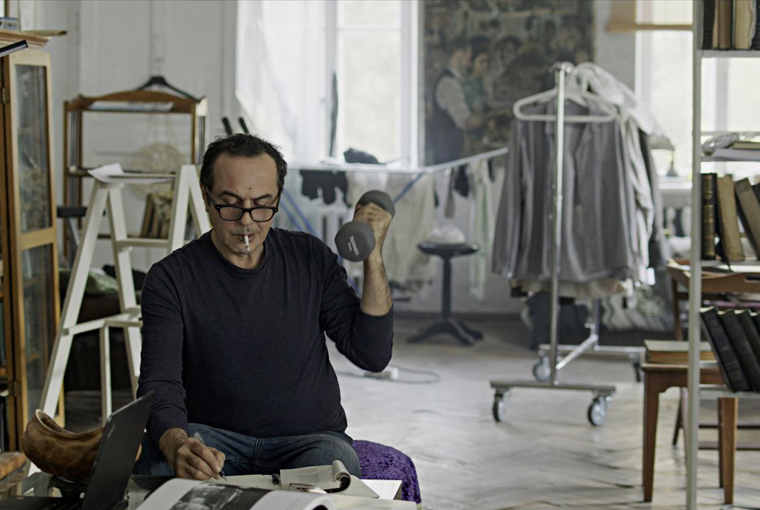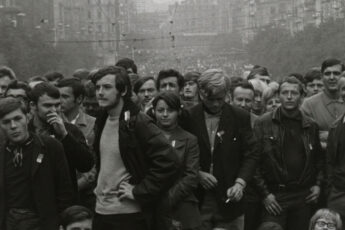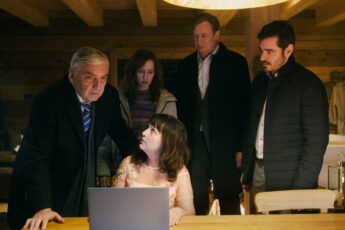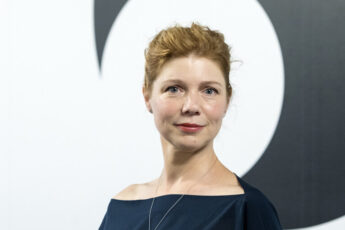Laughing Cockroaches
Aleksei German Jr.’s House Arrest (Delo, 2021)
Vol. 119 (November 2021) by Colette de Castro
Three years after Dovlatov (2018), Aleksei German Jr. has returned with another literary-themed film. Rather than focusing on another author, this time around German chooses to establish the character of an academic specializing in the Silver Age of Russian literature – a period spanning roughly from 1890 to 1930 in which Russian poetry thrived. House Arrest centers around David (Merab Ninidze), a handsome intellectual in his early fifties. Though the parallel with the COVID era is obvious, the director claims it was never intentional. He had started writing the screenplay with co-writer Maria Ogneva long before the pandemic was even heard of.
German Jr. said in an interview that he “was interested in the idea of locking people up under house arrest. They can’t go out and are forced to look back on their life: it’s a new dimension”.1 What David sees looking back on his life isn’t pretty. His friends have all abandoned him, and his wife has left him for a local official. His only loyal supporter is his mother, played by the wonderful actress Roza Khayrullina, whose volcano-like on-screen personality sometimes bubbles up into an outburst of rage which she unleashes on her son by either hitting him with her small fists, or by shouting expletives. Although she professes to be proud of him, her view of society collides with his, and she sees his rebellion as unnecessary and futile.
David is a university professor who has been placed on house arrest on trumped-up charges of siphoning off money that was intended for a university conference. His real crime? Posting a caricature of the mayor and an ostrich in an “unusual position” on Facebook. He has refused to apologize, and so his argument with the mayor has reached outlandish heights. Early on, David describes the situation to his lawyer as “the petty revenge of a small man”. His lawyer Anna (Anna Mikhalkova) has agreed to help him but continues to have reservations – she has been warned that she will be unable to win such a case.
The film takes place in and around the protagonist’s large apartment. The birch trees outside David’s window make for a picturesque view, but the pressure builds throughout the film, and threats grow from outside the house, for instance in the form of protestors standing in his garden. At first, they seem like the biggest threat – they stand up close to his house with their banners, woodenly repeating what the mayor has proclaimed about him. At the height of the drama though, a brick comes flying right through his living room window in the middle of the night. But as time passes, those who enter his house – although they seemed to be on his side at first – turn out to be even more of a threat. Though he is getting very sick, the doctor finally admits one day that she is no longer allowed to treat him. The plumber, David’s drinking buddy who keeps coming over to fix leaks, sadly announces one day that he’s been ordered to cut the water off. Thus the microcosm of society which is David’s flat and its surroundings is gradually unmasked as a very ugly thing. Though he is mostly protected from the rabble by his bourgeois status – as mirrored in his large university-campus flat -, in the end we realize that the real threat comes from those inside his home.
The one ray of hope is his students. They come to celebrate his birthday with a guitar and some bottles of beer. He sits down with them in his garden and makes a short speech about how much they mean to him. His favorite, a Chinese exchange student, says that she needs him to help her with her essay about Osip Mandelstam. Though he has been fired from the university, she insists that none of the other professors understand this poet like he does.
Their in-depth discussion about Mandelstam’s struggles clearly relate to his own. Indeed, Mandelstam’s error was not so different from David’s. He was initially arrested in 1933 for reciting his “Stalin Epigram”, which insulted the Soviet leader. This poem landed Mandelstam in jail and was ultimately, one might argue, what caused his exile and perhaps even his death. In the poem he describes Stalin “The Kremlin Mountaineer” thus:2
the ten thick worms his fingers,
his words like measures of weight,
the huge laughing cockroaches on his top lip,
the glitter of his boot-rims.
Ringed with a scum of chicken-necked bosses.
The parallel between David’s ostrich and Mandelstam’s laughing cockroaches demonstrates that, today as in 1933, caricature is not taken lightly in (Soviet) Russia. While German Jr. is not a political activist, as far as I can tell, repression of free speech is at the forefront of his mind. By placing his character in a huis clos of his own creation, he is well-equipped to examine the tribulations of someone put under political pressure. Clearly, German’s hope lies in young people – they are just beyond reach, but not beyond earshot.
References
- 1.Delo, as seen by Aleksey German Jr., https://www.festival-cannes.com/en/festival/actualites/articles/delo-as-seen-by-aleksey-german-jr [Accessed on December 31, 2021].
- 2.The Stalin Epigram as quoted on Poets.org. See https://poets.org/poem/stalin-epigram [Accessed on December 31, 2021]. Translation by W.S. Merwin and Clarence Brown, published by W.W. Norton & Co, 1989.




Leave a Comment